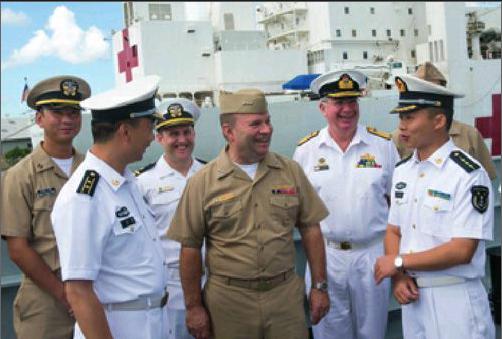Taking Part at Sea
2014-07-28ByDingYing
By+Ding+Ying

China sent a fleet to the Rim Pacific Exercise (RIMPAC) in June, marking the countrys first involvement in the worlds biggest marine military drill, headed by the United States. The drill has provided an opportunity for Beijing and Washington to enhance their military communication and mutual trust.
To reach the common goal of building a new-type relationship between major powers that can benefit world peace and stability, China and the United States should release more positive messages rather than animosity.
Chinas debut
This years RIMPAC is held from June 26 to August 1 with participants from 23 nations.
According to Zhao Xiaogang, drill director of the Chinese fleet, the Chinese Navy is scheduled to participate in exchange events from June 25 to July 8, including press conferences, visits of warships, basketball and football matches and a 5-km cross-country race. During the maritime drills on July 9 to 30, the Chinese vessels will jointly conduct weapons firing,
supplies sea-lifting, damage control, anti-piracy and disaster-relief operations as well as coordinated interceptions and landings, and joint assaults by warships and ship-borne helicopters, he said. With a fleet of over 1,100 naval soldiers and officers, the Chinese fleet is now the second biggest after the U.S. Navy in this years RIMPAC.
Zhang Junshe, a researcher with the Peoples Liberation Army (PLA) Naval Military Studies Research Institute, pointed out that the scale and active involvement of the Chinese fleet indicate that military-tomilitary relations between China and the United States are building momentum since the summit attended by Chinese President Xi Jinping and his U.S. counterpart Barack Obama last summer.
“The United States showed a good posture of ameliorating bilateral military relations,” said Zhang, adding Chinese and U.S. naval chiefs made a joint decision for the formers involvement.
RIMPAC generally includes several levels. Core subjects, which are completed jointly by the U.S. Navy and its allies like the United Kingdom, Japan, Australia, South Korea and Canada, cover fields with actual combat like joint anti-ship and anti-submarine operations, integrated air and marine defense, joint air strikes and amphibious warfare. General subjects, which are conducted by nations that are neither enemy nor friend of the United States, focus mainly on nontraditional security fields like humanitarian assistance, maritime search and rescue, antiterror and anti-piracy. Peripheral countries participate in subjects such as sea queuing, reviewing troops and telecommunications, while observers merely watch and emulate.
